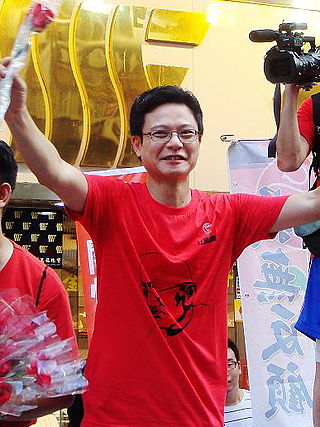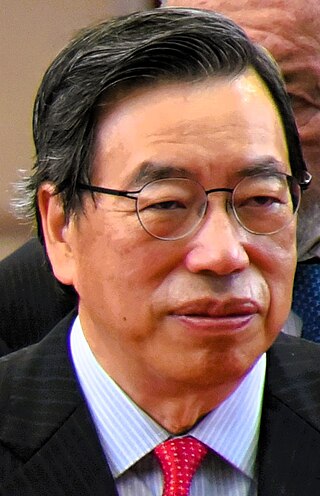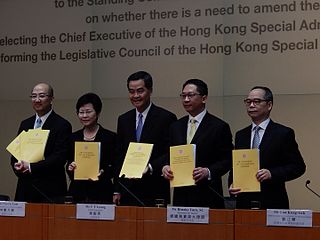
The Democratic Alliance for the Betterment and Progress of Hong Kong (DAB) is a pro-Beijing conservative political party in Hong Kong. Chaired by Gary Chan and holding 13 Legislative Council seats, it is currently the largest party in the legislature and in terms of membership, far ahead of other parties. It has been a key supporting force to the SAR administration and the central government's policies on Hong Kong.

The Democratic Party (DP) is a centre-left liberal political party in Hong Kong. Chaired by Lo Kin-hei, it is the flagship party in the pro-democracy camp and currently has seven elected representatives in the District Councils.

Martin Lee Chu-ming is a Hong Kong politician and barrister. He is the founding chairman of the United Democrats of Hong Kong and its successor, the Democratic Party, Hong Kong's flagship pro-democracy party. He was also a member of the Legislative Council of Hong Kong from 1985 to 1997 and from 1998 to 2008. Nicknamed the "Father of Democracy" in Hong Kong, he is recognised as one of the most prominent advocates for democracy and human rights in Hong Kong and China.

Andrew To Kwan-hang is a Hong Kong politician and activist. He is the former chairman of the League of Social Democrats and former member of the Wong Tai Sin District Council.

The League of Social Democrats (LSD) is a social democratic party in Hong Kong. Chaired by Chan Po-ying, wife of Leung Kwok-hung, it positions itself as the radical wing of the pro-democracy camp and stresses on "street actions" and "parliamentary struggles". It currently holds two seats in the District Councils.

The Political Appointments System is a scheme introduced in 2008 by the Hong Kong Government to reinforce its ministerial team by superseding the Principal Officials Accountability System and inserting two layers of politically appointed officials below the secretaries, who are political appointees. These appointees report only to the secretaries, but not the permanent secretaries, the highest-ranking civil servants. The appointment of undersecretaries and political assistants is an extension of the previous RPAS that was initially confined to principal officials. Prior to the introduction, there were 14 political appointees—3 Secretaries of Departments and 11 Directors of Bureaux.

Andrew Leung Kwan-yuen is a Hong Kong politician who is the current President of the Legislative Council of Hong Kong (Legco), representing the Industrial (First) functional constituency. From October 2012 to October 2016, he was the chairman of Business and Professionals Alliance for Hong Kong (BPA), the second largest party in the legislature.

Starry Lee Wai-king, SBS, JP is a Hong Kong politician and former chairperson of the largest pro-establishment Beijing-loyalist party, the Democratic Alliance for the Betterment and Progress of Hong Kong (DAB). She is a member of the Standing Committee of the National People's Congress (NPCSC), Legislative Councillor for the Kowloon Central geographical constituency, and a Kowloon City District Councillor. From 2012 to 2016, she was a member of the Executive Council.

The Equal Opportunities Commission (EOC) is a public body in Hong Kong that enforces anti-discrimination laws and promotes equality. It was created in 1996 as the city's first semi-governmental body focused on anti-discrimination.
The 2010 Hong Kong electoral reform was the series of events began in 2009 and finalised in 2010 under the Consultation Document on the Methods for Selecting the Chief Executive and for Forming the Legislative Council in 2012, a document published on 18 November 2009 by the Government of Hong Kong to broaden the scope of political participation and increase the democratic elements in the 2012 elections in line with the Hong Kong Basic Law.

People Power (PP) is a populist and radical democratic political party in Hong Kong. Formerly chaired by Raymond Chan, it belongs to the radical wing of the pro-democracy camp and currently holds one seat in the District Councils.

The Fifth Legislative Council of Hong Kong was the fifth meeting of the legislative branch of the Hong Kong Special Administrative Region Government. The membership of the LegCo is based on the 2012 election. The term of the session is from 1 October 2012 to 30 September 2016, during the term in office of the Chief Executive Leung Chun-ying. Due to the new arrangements agreed in a contentious LegCo vote in 2010, the session consists of the new total of 70 seats in LegCo, ten more than previously, with 35 members elected in geographical constituencies through direct elections, and 35 members in functional constituencies, in which five District Council (Second) functional constituency seats each represent all 18 District councils of Hong Kong voted for by all resident voters in Hong Kong. The Democratic Alliance for the Betterment and Progress of Hong Kong remained the largest party while the pan-democrats secured the one-third crucial minority. Notable new members of the LegCo members include Gary Fan from the new established party Neo Democrats and first openly gay councillor, People Power's Ray Chan Chi-chuen.

The Fourth Legislative Council of Hong Kong was the fourth meeting of the legislative branch of the Hong Kong Special Administrative Region Government. The membership of the LegCo is based on the 2008 election. The term of the session is from 1 October 2008 to 30 September 2012, during the second half of the Donald Tsang's administration and first two months of the Leung Chun-ying's term in office. The meeting place was moved from the Legislative Council Building to the new built Legislative Council Complex in 2011. The Democratic Alliance for the Betterment and Progress of Hong Kong remained the largest party with 10 seats. Notable newcomers to the Legislative Council included Regina Ip, Priscilla Leung, Wong Yuk-man, Tanya Chan, and Paul Tse.

The Business and Professionals Alliance for Hong Kong (BPA) is a pro-business pro-Beijing political party in Hong Kong. Chaired by Lo Wai-kwok, the party is currently the second-largest party in the Legislative Council of Hong Kong, holding eight seats. It also has two representatives in the Executive Council and five seats in the District Councils.

The 2014–2015 Hong Kong electoral reform was a proposed reform for the 2017 Hong Kong Chief Executive election and 2016 Legislative Council election.

The 2016 Hong Kong Legislative Council election was held on 4 September 2016 for the 6th Legislative Council of Hong Kong (LegCo). A total of 70 members, 35 from geographical constituencies (GCs) and 35 from functional constituencies (FCs), were returned. The election came after the rejection of the 2016/2017 constitutional reform proposals which suggested the electoral method for the 2016 Legislative Council remains unchanged.

Holden Chow Ho-ding is a Hong Kong solicitor and politician. He is vice-chairman of the Democratic Alliance for the Betterment and Progress of Hong Kong (DAB), the largest pro-Beijing party in Hong Kong, and a former chairman of Young DAB, its youth wing. He was elected to the Legislative Council of Hong Kong in 2016, through the District Council (Second) "super seat". He was re-elected in 2021 through the New Territories North West geographical constituency.
According to Hong Kong Basic Law, the Legislative Council may pass a motion of impeachment against the Chief Executive by a two-thirds majority and report to the Chinese Government for decision. The Council may also vote on non-binding no-confidence motions with a lower threshold.
The election for the President of the First Legislative Council took place on 2 July 1998 for members of the 1st Legislative Council of Hong Kong to among themselves elect the President of the Legislative Council of Hong Kong for the duration of the council. Rita Fan from the pro-Beijing camp, who presided over the provisional legislature, defeated pre-handover President Andrew Wong.
An election for the president of the Legislative Council of Hong Kong took place on 19 February 1993 for members to among themselves elect the first President after abolishing the practice for the governor to preside. Deputy President John Joseph Swaine was unopposed and became the first elected president.
















